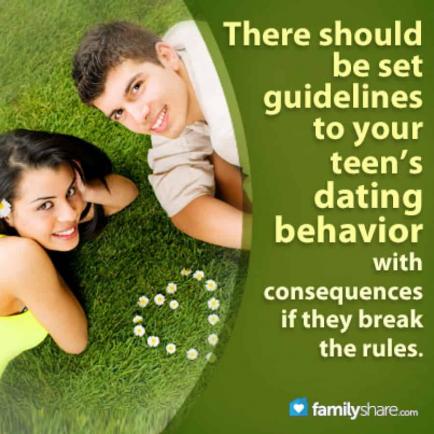
Gone are the days of worrying about a skinned knee while learning to ride a bike. With teenagers, parents worry when their teens begin dating about issues that can have lifetime consequences, such as STD's, pregnancy, sexual abuse, and broken hearts. Taking time to talk to your teen about these issues (in a non-confronting way) can help your teen understand your concerns. Remember that, developmentally, teens are not usually of the mindset that any of these negative consequences can or will happen to them.
There are some real benefits to teen dating and the entire set of experiences gives your teen a way to get their feet wet while exploring romantic relationships. There should be set guidelines to your teen's dating behavior with consequences if they break the rules.
The introduction into dating does not necessarily mean your teen is sexually active. Certainly, the odds are higher that your teen is more likely experimenting sexually when they are in a serious relationship, but not every relationship will lead to sexual activity. It is important for teens to realize that sexually transmitted diseases can be transmitted without intercourse, and know the risks associated with sexual contact for STDs and pregnancy. This information should come from you or a physician, so that your teen knows you are not simply trying to scare them out of sexual activity.
Somewhere along the dating path, your teen will probably date someone (or more than one someone) whom you do not like. There are ways to prevent the "Romeo and Juliet"� syndrome, and still keep the peace at home. If you forbid your teen to see someone whom you do not like, they will often react with wails of, "You just don't understand!"� After the drama ends, your teen will be sneaking off to see their "Romeo"� or "Juliet."�
There are exceptions to this general guideline, and they must be handled with the proper amount of finesse. You should always say something if you see the following situations arise.
1. If you suspect abuse
Teens are at risk for verbal, physical, emotional and sexual abuse and often do not recognize the signs of this type of relationship until it has escalated and significant damage is done. Remember that a person who is an abuser is seeking power and control over another person and is a master at portraying themselves in a good light outside of the incident. If you suspect that your teen is in a potentially abusive relationship, or that the relationship has gone to the level of abuse, it is important to seek help for your teen immediately. Simply telling your teen that he or she (abuse can go both ways), is a victim of abuse will not usually work.
2. The person that your teen is dating uses alcohol or drugs and drives
If you find that this is the situation, you need to forbid the relationship and quickly. Your teen may be in one of two situations in this relationship. They may be using alcohol or drugs as well, which if that is the case, they will need help to stop the behavior. Your teen could also be in a codependent role in the relationship, feeling that they are the person that their boyfriend or girlfriend needs to be able to quit. Explain that this is not realistic and that your teen is not equipped to help the other person without their work towards helping. Search for support groups associated with Alcoholics Anonymous for your teen as a resource and attend with them. This can give your teen further perspective into their motivations and prevent them from falling into this pattern of behavior in the future.
3. If your teen is talking seriously about wedding bells
Your teen may make a few comments, but if there are serious discussions about getting married, there may be other issues (pregnancy) going on. Teen marriages are nearly always a recipe for disaster, and you need to understand how serious the situation is before deciding how best to proceed.

